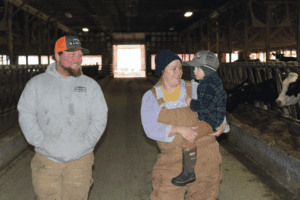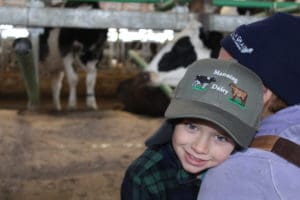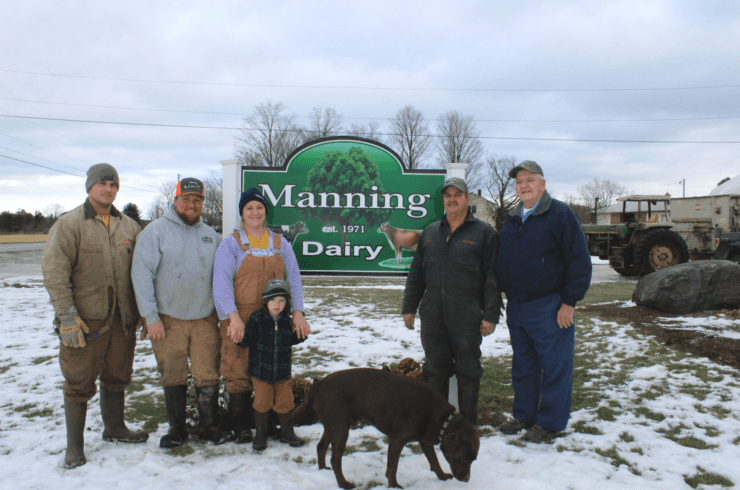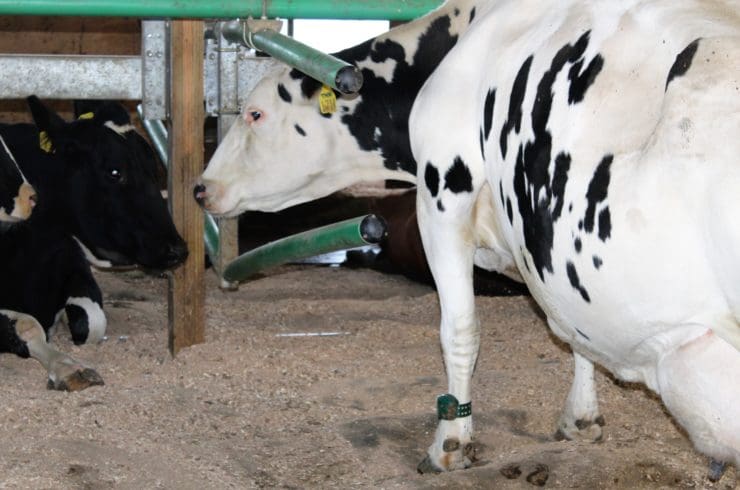It’s a full family effort at Manning Dairy Farm in St. Albans, Vermont – from Grandparents to grandchildren, each generation has a job and they work together to make the 100-plus year old dairy farm successful.
Started in 1917 by Gerald Griswold, the farm has gone through a century of transformations and updates.
Many Vermont dairy farms, like the Manning Farm, have expanded to allow for additional family members to work on the farm. In 1980, Robert and Sandy’s son David returned after college and helped shape the future of the farm. David played a big role in transitioning the farm to a free stall barn in 1980, and putting an addition on the barn in 1997 and again in 2016.
“The barn is self-regulating and has fans and curtains that run automatically based on the temperature outside to keep it 50 – 60 degrees in the barn, which cows prefer,” David said. “For bedding, we use water beds with sawdust on top and rubber non-slip mats in the alleys. Cows generally are sleeping or lounging an average 12 to 14 hours per day. The barns are really comfortable for them.”
In the 1980s many Vermont farms made the switch from the use of tie stall barns where cows are kept in fixed milking stalls, to the free-stall barn where they can roam freely. The cows are moved to a milking parlor designed to milk many cows at the same time, greatly improving efficiency. When the farm started 100 years ago they had just five cows. Today the farm milks 500 cows three times a day. This is possible because three of David’s six children decided to work on the farm, too. David’s daughter Rebecca Howrigan manages the health of the cows.

And movement is an important theme at Manning Dairy Farm – each of their milking cows is equipped with a ‘fitbit’ like activity tracker which helps the farmers monitor the health of their cows. “It’s all important! We will monitor laying time by cow groups, as well as individual cows. It is very helpful used together with step count on individual cows,” explained Rebecca Howrigan, the third generation on the Manning Farm.
On average, the cows at the Manning Farm take about 3,000 to 5,000 steps a day. The data is sent to a computer and Rebecca monitors it constantly throughout the day. Like a person, if a cow isn’t feeling well she’ll be laying down more. The computer has an algorithm that alerts Rebecca so that she can be proactive to help the cow feel better.
“We take the health of our cows very seriously because their health is directly related to their ability to make high-quality milk,” Rebecca said.
Rebecca didn’t always know she would be a dairy farmer. She has an English degree from the University of Vermont and gained experience working for a heifer breeding service, before returning to the farm where she and her husband Patrick are raising their kids – Regan and Ryland.

Rebeca’s younger brothers, Nick and Oliver Manning, ultimately decided that the farm was where they wanted to be as well. Nick manages maintenance on the farm, Oliver focuses on the calves, and they both manage the farm land that is used primarily to grow crops. Just like the barns, the way fields are managed have evolved too. The Manning Farm tractors are outfitted with GPS that allows them to drive themselves, leaving just the turning to the driver. It’s called precision agriculture and it allows farmers to keep a closer eye on their fields.
“It helps us get a better understanding of what the fields need, and it can eliminate human error. We put the GPS system on our corn chopper and so it records all the yield information, and we can see if we needed more fertilizer or less in other places – also what varieties of crops grow better in certain soils,” Oliver said. “In the past, you might put a set quantity of fertilizer or manure on a field – especially with runoff concerns – this technology helps us to make sure the right amount is applied in the right spots to help protect the environment and waterways.”
For the Manning family, this is good news as they look ahead to the next 100 years.
“There’s an opportunity with all the advancements in technology for us to gain efficiencies so we can feed more people on the same land base,” Rebecca said. “Farmers are continuously finding new ways to improve for the good of the environment and our communities.”



